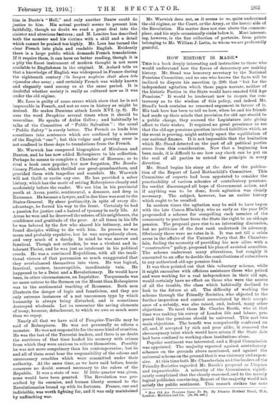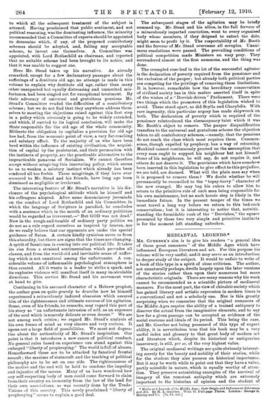HOW HISTORY IS MADE.*
THIS is a book deeply interesting and instructive to those who would understand how the forces of democracy are making history. Mr. Stead was honorary secretary to the National Pensions Committee, and no one who knows the facts will be inclined to dispute his assertion '(p. 290) that " but for the independent agitation which these pages narrate, neither of the historic Parties in the State would have enacted Old Age Pensions." It would be irrelevant now to reopen the con- troversy as to the wisdom of this policy, and indeed Mr. Stead's book contains no reasoned argument in favour of it. His task here has been to tell ns bow, when he and his friends, had made up their minds that provision for old age should be a public charge, they coerced the Legislature into giving effect to their wishes. It required no great prescience to see that the old-age pensions question involved liabilities which, as
the event is proving, might entirely upset the equilibrium of our national finance. It is not impossible that the hesitation which Mr. Stead detected on the part of all political parties arose from this consideration. Now that a beginning bas been made, it is difficult to see how any check can be put on the zeal of all parties to extend the principle in every direction.
Mr. Stead begins his story at the date of the publica- tion of the Report of Lord Rothschild's Committee. This Committee of experts had been appointed to consider the practicability of various schenies of contributory pensions. Its verdict discouraged all hope of Government action, and if anything was to be done, fresh agitation was clearly necessary. The subject, however, has an earlier history which ought to be recalled.
In modern times the agitation may be said to have begun with the late Canon Blackley, who as early as the year 1878 propounded a scheme for compelling each member of the community to purchase from the State the right to an old-age pension. The proposal gave rise to an interesting discussion, but no politician of the first rank undertook its advocacy. Obviously there were no votes in it. It was not till a crisis arose in the affairs of the Unionist Party that Mr. Chamber- lain, feeling the necessity of providing his new allies with a " constructive" policy, proposed his plan of assisted annuities. The scheme underwent many alterations, but roughly it amounted to an offer to double the contributions of subscribers to any authorised old-age pension fund.
It was then pointed out that this voluntary scheme, while it might encumber with officious assistance those who prized and were working for a real independence in their old age, would certainly have no effect on those who were the source of all the trouble, the class which habitually declined to look to the future at all. The difficulty of working the scheme through the Friendly Societies, who objected to the further inspection and control necessitated by their accept- ance of a subsidy, was also raised, and, indeed, many other objections. To meet these Mr. Charles Booth, who at that time was making his survey of London life and labour, pro- posed that the pensions should be universal. This met two main objections. The benefit was compulsorily conferred on all, and, if accepted by rich and poor alike, it removed the eleemosynary taint which would have arisen if the State dole had been confined to working-class institutions alone.
Popular sentiment was interested, and a Royal Commission was appointed. The majority reported against contributory schemes on the grounds above mentioned, and against the universal scheme on the ground that it was visionary and expen- sive. At this time both Mr. Chamberlain and the leaders of the Friendly Societies regarded Mr. Booth's proposal as Utopian and impracticable. A minority of the Commission signifi- cantly complained that the closely reasoned, and to the merely logical politician convincing, Report of the majority would not satisfy the public sentiment. This remark strikes the note
• now Old Age Pensions Came To Be. By Francis Herbert Stead, M.A. London Methuen and Co. [2s. ed. net.]
to which all the subsequent treatment of the subject is attuned. Having proclaimed that public sentiment, and not political reasoning, was the dominating influence, the minority recommended that a Committee of experts should be appointed to determine which, if any, of the proposed contributory schemes should be adopted, and, failing any acceptable scheme, to invent one themselves. A Committee was appointed, with Lord Rothschild as chairman, and reported that no suitable scheme had been brought to its notice, and that it was unable to suggest one.
Here Mr. Stead takes up his narrative. As already remarked, except for a few declamatory passages about the sufferings of a destitute old age, no attempt is made in this volume to explain why destitute old age, rather than many other unexpected but equally distressing and unmerited mis- fortunes, had been singled out for exceptional treatment. By their advocacy of universal and gratuitous pensions Mr. Stead's Committee evaded the difficulties of a contributory scheme ; but we do not find that they anywhere address them- selves to meeting the objections raised against this first step in a policy which obviously is going to be widely extended, and which, if carried to its logical conclusion, will make the State responsible for the old age of the whole community. Hitherto the obligation to capitalise a provision for old age has had, from the economic point of view, a very far-reaching and salutary effect. To the majority of us who have been bred within the influence of existing civilisation, the acquisi- tion of capital by the proletariat, and their permeation with the instincts of property, are the practicable alternative to the impracticable panaceas of Socialism. We cannot therefore accept without misgiving this innovating policy, which seems to us to weaken a salutary instinct which already has been rendered all too feeble. These misgivings, if they have ever occurred to Mr. Stead and his friends, have long ago been dismissed as negligible or irrelevant.
The interesting feature of Mr. Stead's narrative is his dis- closure of the psychological attitude which he himself and his colleagues adopted. After some denunciatory jeremiads on the conduct of Lord Rothschild and his Committee, in which the language of Scripture is parodied, he concludes with a sentence which in the mouth of an ordinal.), politician would be regarded as irreverent,—" But GOD was not dead." Now in the rough-and-tumble of ordinary party politics we do not as a rale regard ourselves as inspired by heaven, nor do we really believe that our opponents are under the special guidance of Satan. A certain kindly cynicism saves us from this absurdity, but there are signs that the times are changing. A spirit of fanaticism is coming into our political life. It takes its rise from a strained sentimentalism which pervades all classes, and from the world-old and inevitable sense of suffer- ing which is not unnatural among the unfortunate. A con- siderable volume of inflammable psychological atmosphere is thus created. All it wants is a leader to strike a spark, and its explosive violence will manifest itself in many incalculable directions. This service Mr. Stead and his movement were at hand to give.
Continuing in his assumed character of a Hebrew prophet, the author goes on quite gravely to describe how he himself experienced a miraculously induced obsession which assured him of the righteousness and ultimate success of his agitation. Some, even of his friends, he remarks, may regard this part of his story as "an unfortunate intrusion of self, as an exposure of the soul which is scarcely delicate or even decent." We are not among such critics ; we regard Mr. Stead's analysis of his own frame of mind as very sincere and very curious. It opens out a large field of possibilities. We must not dogma- tise about the authenticity of Mr. Stead's inspiration. Our point is that it introduces a new canon of political conduct. No general rules based on experience can stand against this enlarged "liberty of prophesying." The world is full of abuses. Henceforward these are to be attacked by fanatical frontal assault ; the maxims of statecraft and the teaching of political philosophy are to be set on one side. The righteousness of the motive and the end will be held to condone the impolicy and injustice of the means. Many of us have wondered bow any self-respecting body of men could come forward to claim from their country an immunity from the law of the land for their own associations, as was recently done by the Trade- Unions of this country. This newly proclaimed "liberty of prophesying" seems to explain a good deal. The subsequent stages of the agitation may be briefly summed up. Mr. Stead and his allies, in the full fervour of a miraculously imparted conviction, went to every organised body whose members, if they deigned to extort the dole, might seem to profit by it. The respectability of Mr. Booth and the fervour of Mr. Stead overcame all scruples. Unani- mous resolutions were passed. The prevailing conditions of political competition made Ministers an easy prey.. They surrendered almost at the first summons, and the thing was done.
The crumpled rose-leaf in the lot of the successful agitator is the declaration of poverty required from the pensioner and the exclusion of the pauper; but already both political parties are competing for the privilege of removing these limitations. It is, however, remarkable how the hereditary conservatism of civilised society has in this matter asserted itself in spite of the wishes of a "Dervish-driven" Parliament. There were two things which the promoters of this legislation wished to avoid. These stood apart, as did Scylla and Charybdis. With rare ingenuity, this particular argosy has made shipwreck on both. The declaration of poverty which is required of the pensioner reintroduced the eleemosynary taint which it was Mr. Booth's object to remove. The pauper disqualification transfers to the universal and gratuitous scheme the objection taken to all contributory schemes,—namely, that the pensions do not reach the class which most requires them. Common- sense, though expelled by prophecy, has a way of returning. Mankind cannot continuously proceed on the assumption that every man ought to support his neighbour but not himself. Some of his neighbours, he will say, do not require it, and others do not deserve it. The provisions which have somehow been inserted in this legislation to give effect to this prejudice, we are told, are doomed. What will the plain man say when it is proposed to remove them ? We doubt whether he will permanently be reconciled to the " topsy-turvy " character of the new evangel. He may beg his rulers to allow him to return to the primitive rule of each man being responsible for his own maintenance, but no such heroic step is likely in the immediate future. In the present temper of the times we must travel a long way before we return to this bed-rock conservatism; but it is interesting to notice that, notwith- standing the formidable rush of the "Dervishes," the square presented by these two very simple and primitive instincts is for the moment left standing unbroken.











































 Previous page
Previous page